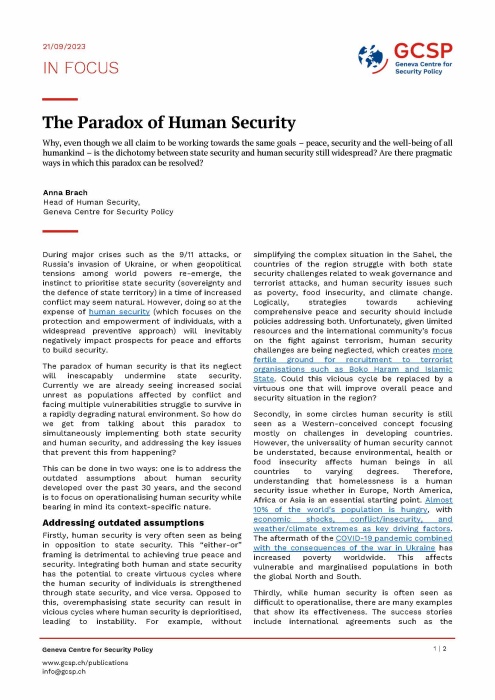The Paradox of Human Security
Why, even though we all claim to be working towards the same goals – peace, security and the well-being of all humankind – is the dichotomy between state security and human security still widespread? Are there pragmatic ways in which this paradox can be resolved?
During major crises such as the 9/11 attacks, or Russia’s invasion of Ukraine, or when geopolitical tensions among world powers re-emerge, the instinct to prioritise state security (sovereignty and the defence of state territory) in a time of increased conflict may seem natural. However, doing so at the expense of human security (which focuses on the protection and empowerment of individuals, with a widespread preventive approach) will inevitably negatively impact prospects for peace and efforts to build security.
The paradox of human security is that its neglect will inescapably undermine state security. Currently we are already seeing increased social unrest as populations affected by conflict and facing multiple vulnerabilities struggle to survive in a rapidly degrading natural environment. So how do we get from talking about this paradox to simultaneously implementing both state security and human security, and addressing the key issues that prevent this from happening?
This can be done in two ways: one is to address the outdated assumptions about human security developed over the past 30 years, and the second is to focus on operationalising human security while bearing in mind its context-specific nature.
Addressing outdated assumptions
Firstly, human security is very often seen as being in opposition to state security. This “either-or” framing is detrimental to achieving true peace and security. Integrating both human and state security has the potential to create virtuous cycles where the human security of individuals is strengthened through state security, and vice versa. Opposed to this, overemphasising state security can result in vicious cycles where human security is deprioritised, leading to instability. For example, without simplifying the complex situation in the Sahel, the countries of the region struggle with both state security challenges related to weak governance and terrorist attacks, and human security issues such as poverty, food insecurity, and climate change. Logically, strategies towards achieving comprehensive peace and security should include policies addressing both. Unfortunately, given limited resources and the international community’s focus on the fight against terrorism, human security challenges are being neglected, which creates more fertile ground for recruitment to terrorist organisations such as Boko Haram and Islamic State. Could this vicious cycle be replaced by a virtuous one that will improve overall peace and security situation in the region?
Secondly, in some circles human security is still seen as a Western-conceived concept focusing mostly on challenges in developing countries. However, the universality of human security cannot be understated, because environmental, health or food insecurity affects human beings in all countries to varying degrees. Therefore, understanding that homelessness is a human security issue whether in Europe, North America, Africa or Asia is an essential starting point. Almost 10% of the world’s population is hungry, with economic shocks, conflict/insecurity, and weather/climate extremes as key driving factors. The aftermath of the COVID-19 pandemic combined with the consequences of the war in Ukraine has increased poverty worldwide. This affects vulnerable and marginalised populations in both the global North and South.
Thirdly, while human security is often seen as difficult to operationalise, there are many examples that show its effectiveness. The success stories include international agreements such as the Ottawa Treaty banning landmines (1997); the additional protocol on child soldiers to the Convention on the Rights of the Child (2000); or addressing the challenge of small arms through instruments such as the Arms Trade Treaty (2014). Other examples include UN Security Council Resolution 1325 on Women, Peace and Security and efforts made to agree on the non-legally binding Global Compact on Migration. Regarding security policy, Japan and Switzerland both include human security as one of their foreign policy elements. Finally, the United Nations adopts it in its programming. In short, it is possible to reach compromise, cooperate, and implement provisions of human security even in challenging times.
Sticking to the basics and applying them in practice
Several steps can simultaneously be taken to embrace the human security concept and apply it in practice.
Firstly, the silos will need to be broken down between state security and human security. Each security threat has both a state and human security element. Traditionally human security challenges such as food or environmental security increasingly affect state security. Similarly, traditionally state security issues such as the development of new technologies are seen as new-generation threats to human security. Addressing all security challenges requires the comprehensive understanding of their state and human security aspects and, hence, innovative coalitions of actors in individual countries and regions. One example on a local scale is the city of Medellín in Colombia, where the local government and civil society came together and dramatically increased urban security. Regionally, organisations such as the EU in its 2016 Global Strategy or NATO in its 2022 Strategic Concept have introduced human security as an important part of their approach. Yet it is essential to put these documents into practice much more, for example, in the Sahel.
Secondly, we should take the call for the empowerment of individuals and communities seriously. In the context of human security, empowerment means increased resilience and well-being and shifts the focus from threats to solutions. There are many successes that could be replicated and scaled up in the future. Some examples include the Farmer Managed Natural Regeneration (FMNR) project, which is decreasing conflicts in rural areas through land restoration, or the way in which programmes such as the Global Community Engagement and Resilience Fund are creating conditions for local communities that will help to prevent violent extremism. The empowerment of local communities through the political reform of land ownership systems or decentralisation (under certain conditions) may have a positive impact on local conflict reduction and prevention.
Thirdly, we should think long term about the allocation of resources to address threats to peace and security. The New Agenda for Peace’s call to reduce military spending and focus on financing for peace is critical in this regard. The 2022 figure for global military expenditure is a staggering US$2,240 billion; yet, according to the World Food Programme, it would cost only US$40 billion each year to end world hunger by 2030. In 2020 the flow of climate finance from developed to developing countries was between US$21 billion and US$83.3 billion out of the promised $100 billion. We are crossing planetary boundaries by using Earth’s resources beyond its capacity. How we allocate resources matters, and so do the priorities we set in terms of overemphasising state security at the expense of human security.
Conclusion
The responsibility for action and leadership on this issue lies with states’ policymakers, while international and regional organisations can play an influencing and normative role based on their respective mandates. Achieving improved global peace and stability requires policies and programmes to achieve state and human security to be designed and implemented on an equal footing. The New Agenda for Peace points out that a great deal of progress has been achieved since the creation of the United Nations – yet room for improvement is still significant. Human security is only mentioned twice in the New Agenda for Peace, but its spirit permeates the preventive approach of the document, as well as the need to give agency to those affected by conflict and other security challenges. Whatever approach we take, it is crucial that, as the New Agenda for Peace points out, trust, solidarity, and universality should be the basis on which comprehensive peace and security will have to be built if we are to meet the goal of safe, stable, and prosperous societies for all.
Disclaimer: The views, information and opinions expressed in this publication are the author’s/authors’ own and do not necessarily reflect those of the GCSP or the members of its Foundation Council. The GCSP is not responsible for the accuracy of the information.


